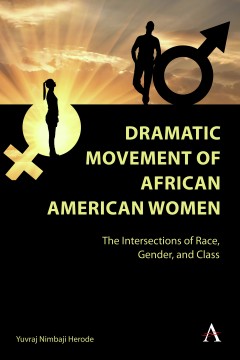Dramatic Movement of African American Women
The Intersections of Race, Gender, and Class
By Yuvraj Nimbaji Herode
Other Formats Available:
E-Book- About This Book
- Reviews
- Author Information
- Series
- Table of Contents
- Links
- Podcasts
About This Book
This is a comprehensive book about the three significant African American women dramatists whose plays illustrate the debilitating effects of racism, sexism, and classism on African Americans in general and African American women in particular. The book explicates the novel ideas about the African American women who have been oppressed by the men (both white and black); however, they launch a rebellion against the oppressive hegemonic white culture, African American patriarchy, and white materialistic ideology. This book offers an exhaustive background of the social, economic, political, and cultural history of African Americans in general and how the social, economic, political, and cultural history of African American women is different than that of white men, white women, and African American men in particular. The book also discusses how the images of African American women in American mainstream theater and African American male theater are different than the images of African American women in African American women’s dramas.
The themes of the book are the African American women as warriors or militants. African American women playwrights have transformed and re-invented American theater by writing plays for African American theater which focus on African American concerns, delineation of blackness, challenging the racial and gender authorities, projection of black womanhood, and production of African American history. African American women were truly and genuinely excluded from American mainstream theater because they were projected as stereotypes in American mainstream dramas and theater. Therefore, these women dramatists carried out the African American women’s voice on the African American stage by telling the story of their race, history, African identity as well as being a woman. In their plays, they voice against the brutal treatment meted out to them by the white patriarchal social order and also by the African American patriarchy.
African American women dramatists depict social violence, rape, suicide, domestic violence, racial violence, verbal abuse, child molestation, and so on. In most cases, black women are the victims of the violence and are portrayed as mere objects in a discourse of domination that African American women playwrights challenge. The main characters in the plays are not presented as mere objects, passive victims who endure subjugation; they are surrounded by brutal behavior and they use violence too. This shift in identification and focus is clearly influenced by the playwrights’ adherence to African American feminist thought.
Reviews
“Though this book deals with the issues of race, gender, and class, it focuses on their repercussions on African American women in a different way. The historical oppressions and the struggle of African American dramatists, both male and female, have been exposed with a difference. Their hardship, leadership, motherhood, womanhood, intellect, and artistic expressions have enhanced the African American community, which has been exhibited in African American drama and theater.” —Dr. Morey Dipak Tryambak, Assistant Professor, University of Hyderabad, India.
Author Information
Dr Yuvraj Nimbaji Herode is an assistant professor in the Department of English and Modern European Languages, University of Allahabad, Prayagraj, Uttar Pradesh, India.
Series
Anthem Africology Series
Table of Contents
Acknowledgements; Foreword; Chapter 1- Introduction to Dramatic Movement of African American Women; Chapter 2- Alice Childress; Chapter 3- Lorraine Hansberry; Chapter 4- Suzan-Lori Parks; Chapter 5- Conclusions; Bibliography; Index
Links
Stay Updated
Information
Latest Tweets



